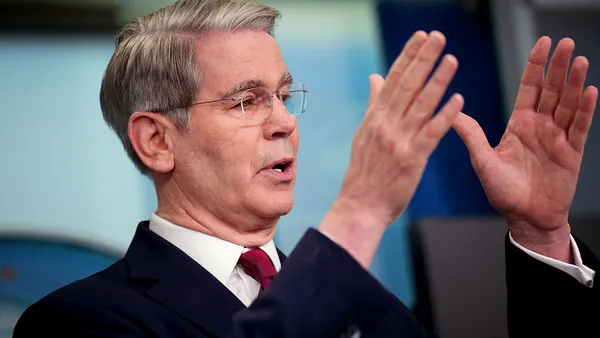As top U.S. banks including JPMorgan Chase and Capital One slowly exit the agricultural lending sector, Rabobank’s U.S.-based Rabo AgriFinance plans to pick up the slack.
The farm-loan portfolios of the nation's top 30 banks declined 17.5%, or $3.9 billion, to $18.3 billion between their peak in December 2015 and March 2019, a recent Reuters report found.
But for Rabo AgriFinance, whose sole focus is on farm-loan lending, business has grown 7% during that same period, Curt Hudnutt, the firm’s executive vice president, told Banking Dive.
“The big banks have never played a significant role, in my opinion, in ag lending, even when they've had exposures,” he said, referring to the trend of larger banks trimming their farm portfolios.
Hudnutt said Rabo AgriFinance, a subsidiary of Dutch multinational banking and financial services company Rabobank, has about $15 billion in total loans outstanding.
“We're solely focused, outside of the Netherlands, on food and agribusiness. So we know and believe that we have to be in this space in good times and bad,” Hudnutt said. “We're active in the space and when things aren't going so well for our clients and prospects, to be honest, we're even more active because we believe we can bring solutions to the right producers to help them weather the downturn.”
According to the Reuters report, shrinking cash flow and the escalating U.S.-China trade war is causing some farmers to retire early and others to declare bankruptcy.
Total U.S. farm debt is expected to rise to $426.7 billion this year, according to the U.S. Department of Agriculture, approaching levels seen in the 1980s farm crisis.
“Right now we're in an ag recession, and it’s been happening for about five years now,” Hudnutt said. Hudnutt, whose parent company Rabobank is private, declined to share Rabo AgriFinance’s default rate, but said it is generally in line with the market.
“So we're going to be in the 1.5% to 2% range, generally at the bottom of cycles or at the top of cycles and below 1% when things are going well,” Hudnutt said.
To manage the risk that comes with servicing the farm industry, Hudnutt said the company relies heavily on its analysts.
“There's a lot of risk in any commodity based business,” he said. “We have 90 of them across the globe that focus only on agriculture and writing about agriculture, economics and studying agriculture.”
Hudnutt said Rabo AgriFinance’s finance knowledge networks are a core aspect of the company’s value proposition.
“We’re looking at how we connect our producers here in the U.S., either with other producers across the nation or globally in the other areas in which we operate. We're looking at producers that are focused on what's going on from a global market perspective and how does that impact that business here? And we're looking for somebody that's seeking more than simply the cheapest lending, but really seeking on building a long-term relationship over generations,” he said.
Hudnutt said another key to managing risk is studying the marketing plans and marketing acumen of the producer.
“Quality of financial information is really a key driver. As they need to access more capital per operation, what's their sophistication in the finance area?” he said.
Hudnutt said the firm is also looking for borrowers who are good stewards of the land, with long-term sustainability practices in place.
“I fully expect, until the outlook for agriculture improves, [larger banks] will continue to lessen their exposure to agriculture,” Hudnutt said. “But I think between the Farm Credit System and ourselves, we're well-positioned to take on good quality producers that are no longer financed by the larger banks.”
The Farm Credit System, a network of 73 customer-owned financial institutions that provide loans and financial services to U.S. agribusinesses, provided $15.5 billion in new loans to farmers and ranchers in 2018, according to data on its website.
“The big banks, they've always been in and out. When things are good they're in. When things are bad they're out. They can do that because they have other places to put their money,” Hudnutt said. “We believe that the U.S. farmer is leading in this space and we believe that it’s a great growth opportunity for Rabobank.”













